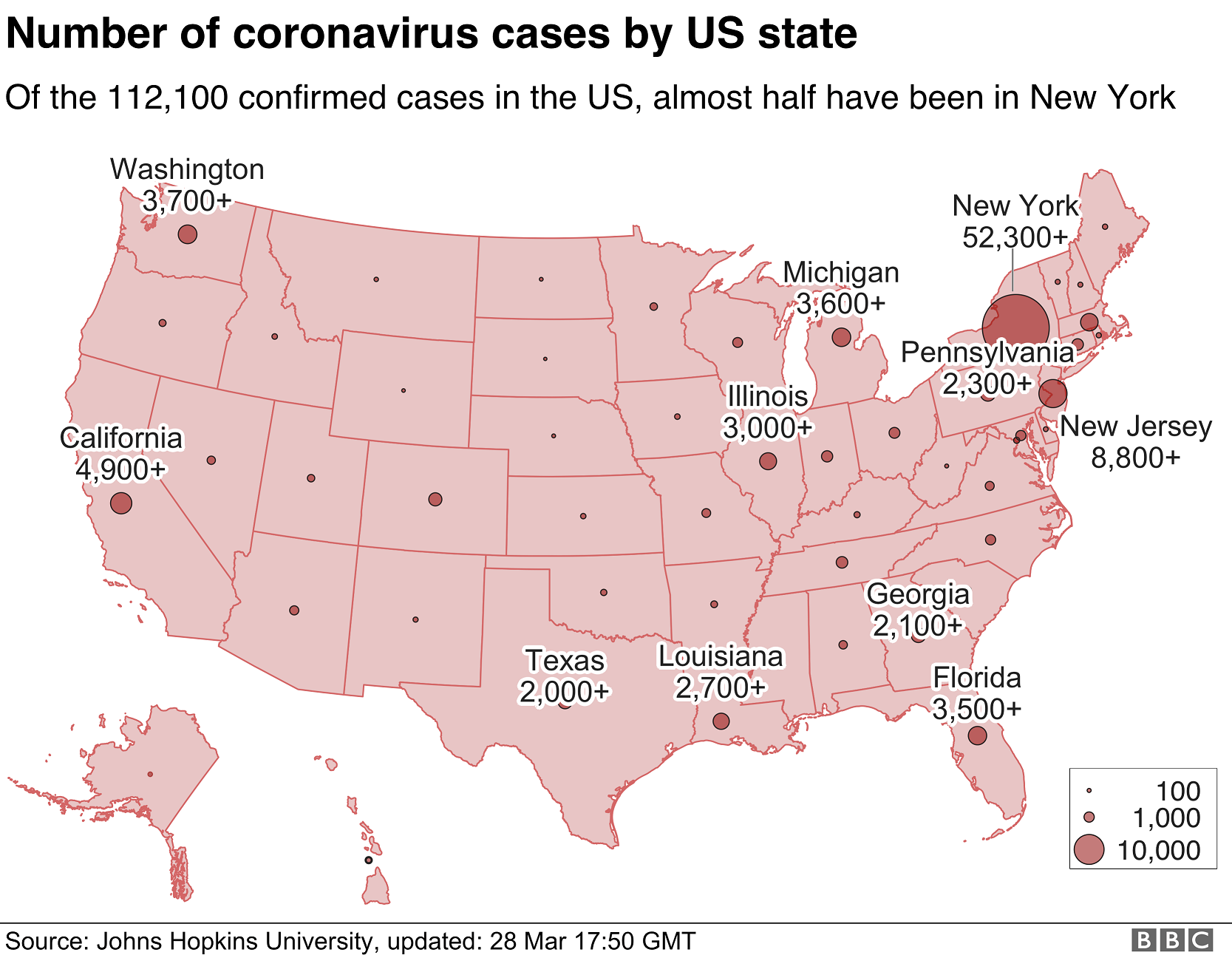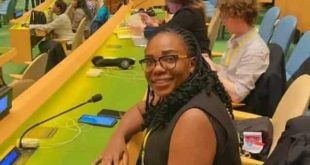US President Donald Trump has said he is considering imposing a quarantine on New York in a bid to slow the spread of the coronavirus.
“We’d like to see [it] quarantined because it’s a hotspot,” he told reporters. “I’m thinking about that.”
He spoke as confirmed cases in the state increased to more than 52,000, around half of the total in the US.
But the state’s governor, Andrew Cuomo, said he had not discussed such measures with the president.
“I didn’t speak to him about any quarantine,” he told reporters shortly after he had spoken with Mr Trump by phone.
“I haven’t had those conversations,” he added. “I don’t even know what that means.”
New York state has the highest number of cases of Covid-19 in the US.
Speaking before he left to visit a Navy hospital ship in Virginia, Mr Trump said that “New Jersey [and] certain parts of Connecticut” could also be quarantined under the measures.
“We might not have to do it but there’s a possibility that sometime today we’ll do a quarantine — short term [for] two weeks,” he said.
But Mr Cuomo, who was holding a daily press briefing at the time of Mr Trump’s comments on Saturday, expressed concern at the idea.
“I don’t know how that can be legally enforceable,” he said. “And from a medical point of view, I don’t know what you would be accomplishing.”
“But I can tell you I don’t even like the sound of it,” he added. “Not even understanding what it is, I don’t like the sound of it.”
Mr Trump did not provide further details about what a quarantine on New York or other badly hit US cities would look like.
But he said it would be aimed at slowing the spread of the virus to other parts of the US.
“They’re having problems down in Florida. A lot of New Yorkers are going down. We don’t want that,” he said as he left the White House.
Similar quarantine measures in other countries have involved widespread closures, bans on public gatherings and major restrictions on travel in and out of the affected area.


New York has banned any major gatherings in the state and ordered everyone to remain at home in an effort to slow the spread.
The White House has said anyone leaving New York City should self-isolate for 14 days. On Friday, the governor of nearby Rhode Island deployed National Guard troops to stop cars with a New York license plate to remind them of the state’s restriction that they quarantine.
Soldiers are going door-to-door in coastal vacation communities to ask if any residents had recently visited New York City.

How can it be enforced?
Analysis by Peter Bowes, BBC News, Los Angeles
The quarantining of entire states would mark a significant and ominous ramping up of the Trump administration’s response to the coronavirus.
There have been rumours, for the past two weeks, that a mandatory, national quarantine could be implemented, but this is the first time Mr Trump has indicated that state borders could be closed.
The initial response of Andrew Cuomo, the governor of New York, suggests an attempt by the federal government to quarantine the state could be problematic.
While the president does have sweeping powers, especially during a national emergency, it is the role of state and local governments to take the lead in preventing the spread of disease.
Mr Trump said there would be a decision very soon and that trade between states would not be affected. But if he goes ahead, such an order could be challenged in the courts.

What’s the latest in the US?
With more than 1,800 virus-related fatalities, the US death toll remains lower than those in Italy and China. But there are virus hotspots in New York, New Orleans, Detroit and Seattle.
In his press briefing, Mr Cuomo said New York was postponing its presidential primary by almost two months until 23 June as a result of the outbreak.
He also said the apex of the crisis will occur in the next 14 to 21 days.
Mr Cuomo said the state would soon require 30,000 respiratory ventilators, which had increased in price to $45,000 (£36,000) each due to demand.
He added that Mr Trump had approved the construction of four temporary hospitals.
Demand for ventilators has also doubled in the southern state of Louisiana. Governor John Bel Edwards said New Orleans would run out of ventilators by 2 April and possibly run out of hospital beds by 7 April if the number of new infections did not subside.
“It’s not some flimsy theory. This is what is going to happen,” he said.
Hospitals in New York City are rapidly running out of medical equipment and personal protective gear. More widely, the mayors of most US cities have said they expect massive shortages of critical personal safety equipment in the coming weeks.
On Saturday, Mr Trump watched as the USNS Comfort, a Navy hospital ship with 1,000 beds aboard, left for New York from Virginia. It will station itself at a Manhattan pier to deal with the overload of patients that New York expects.
It came after Mr Trump signed a $2.2 trillion (£1.8tr) bailout bill passed by Congress on Friday, the largest fiscal stimulus in US history.
In other developments:
- More than 600,000 infections have been confirmed globally and more than 30,000 deaths, according to figures collated by Johns Hopkins University
- The city in China where the coronavirus pandemic began, Wuhan, has partially re-opened after more than two months of isolation. People are being allowed to enter but not leave, according to reports
- Italy has confirmed more than 10,000 fatalities after a further 889 people died in the last 24 hours
- The death toll in Spain has exceeded 5,000, after it reported 832 more fatalities. Spain is the world’s worst hit country after Italy
- The US now has the highest number of confirmed infections in the world at 112,000
- South Korea says that for the first time it now has more people who have recovered from the virus than are still infected.
- Russia and Ireland are among the latest countries to bring in new restrictions to try to slow the spread of the virus. In Russia, shopping centres, restaurants and cafes have been ordered to close . In Ireland, people will have to stay at home with limited exceptions for the next two weeks
- In the UK, frontline National Health Service staff in England will begin being tested this weekend to see if they have coronavirus
BBC
 Home Of Ghana News Ghana News, Entertainment And More
Home Of Ghana News Ghana News, Entertainment And More





